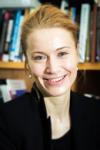Sigrun Kahl
Asst Prof Political Science and Sociology
Address:
115 Prospect St, New Haven, CT 06511
203-432-0280
Sigrun Kahl studies how long-term comparative historical factors such as religion shape current policies and institutions for addressing, among other things, poverty, unemployment, education, and abortion. Among courses she teaches are Welfare States Across Nations, Religion and Politics, and Historical and Archival Methods. She is co-director of the MacMillan Center Initiative on Religion, Politics, and Society and co-runs the Yale Political Science Department’s Comparative Politics Workshop.
She is currently completing two book manuscripts. Just Deserts: The Moral Economy of Welfare in Europe and the United States develops a theory of the welfare state as a system of reciprocity in which each benefit institutionalizes particular individual rights and responsibilities. The book analyzes the last resort safety net (“welfare”), combining public opinion surveys, caseload data and other statistics, interviews with policymakers and practitioners, and “front-line” local observations in Denmark, France, Germany, Italy, Sweden, the United Kingdom, and the United States. It argues that the rights and responsibilities of the poor differ across countries and change over time, depending on deservingness: Societies relieve poverty with welfare if they perceive poverty as fate, and the poor as victims of injustice and bad luck. They seek to correct the poor with work if they view poverty as the fault of the poor, who are lazy freeloaders. The book traces how these moral judgments become public policy, from national politicians’ deliberations to local caseworkers’ everyday adjudication of “just deserts.”
Poverty and Eternity: How Religion Shapes Assistance to the Poor, from Early Church to Modern Welfare State investigates where these striking cross-national variations in deservingness come from. It argues that societies’ responses to poverty depend on their dominant religious legacies. What modern governments do to save the poor from a life in deprivation depends on what early modern Catholics, Calvinists, and Lutherans believed about who was saved in the afterlife. 16th century reformers institutionalized these beliefs in confessional poor relief, until the nation state incorporated and secularized these institutions and the underlying ideas about poverty.
A third project explores the origins of the boundaries between state and non-state public provision in education, healthcare, and social services. Church Space, State Space: A Comparative-Historical Explanation of Nonprofit Sector Variations in Europe, Australia, and the United States suggests that these policy areas were historically church “territory” and that the variation in nonprofit sector size and government funding depends on how the distribution of responsibilities between state and church(es) evolved in the 19th century.

